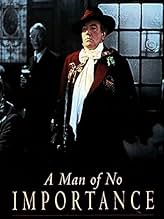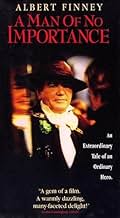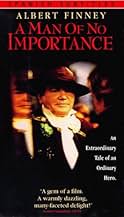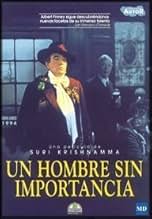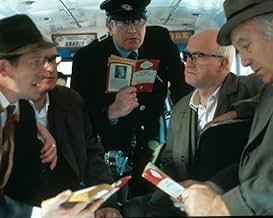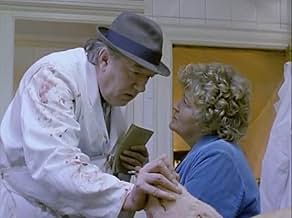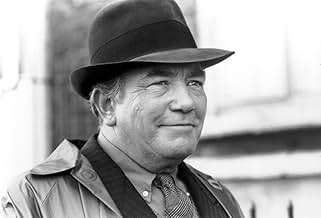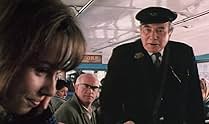CALIFICACIÓN DE IMDb
6.7/10
1.3 k
TU CALIFICACIÓN
Una poesía amistosa que cita a un conductor de autobús en 1963 en Dublín quiere poner en escena la obra de Oscar Wilde, Salomé, con los pasajeros de su autobús.Una poesía amistosa que cita a un conductor de autobús en 1963 en Dublín quiere poner en escena la obra de Oscar Wilde, Salomé, con los pasajeros de su autobús.Una poesía amistosa que cita a un conductor de autobús en 1963 en Dublín quiere poner en escena la obra de Oscar Wilde, Salomé, con los pasajeros de su autobús.
- Dirección
- Guionista
- Todo el elenco y el equipo
- Producción, taquilla y más en IMDbPro
Opiniones destacadas
A slight film of forbidden love in early sixties Dublin. There is some great period detail and some lovely funny and touching and dark scenes, but the film IS Albert Finney - a momentous performance as a gay man desperate to consummate his passion for a man he knows he cannot have, and desperate also to create beautiful things in a grey, humdrum world which just doesn't understand him. Finney is absolutely fantastic.
There's a great deal of simple magic in this film, a loving, humorous community, a man with his mind on a project, mainly setting aside his own deepest desires - "Me arms are innocent of affection" - to try and bring joy to those around him, a handful of varied but mainly endearing characters (one of the few villains is actually pretty low-key). Tara Fitzgerald has the touching sweetness of an Emily Mortimer, even as her own simmering impulses are brought to light. Some of the incidents, given the overall theme of closeted homosexuality, are a tad predictable and overall the film often has the genial small town feeling of a modern BBC series like "Father Brown". But it is gently and warmly engaging.
Normally I do not like Albert Finney. In fact I think he's one of the most overrated actors in film (I suspect his style of acting works much better on stage). This movie was an exception. For once he played a real person, and, except for one or two scenes, managed to quench his desire to gnaw at the scenery. I found myself totally identifying with the lead character for once. All of the acting is very effective, and the story is believable. A rare thing in movies. This would be a good double bill for 'My Beautiful Laundrette'. Odd that Indian's present homosexuality believably in English films, but I have never scene an Indian film even portray homosexuality (and, yes, I have seen many Indian films).
Dublin in 1960,such an ideal locale for a story such as this one.You may just kick yourself for not viewing it sooner.I would enjoy it more if it had nothing to do with Oscar Wilde..however it captured an Irish American's heart.
Albert Finney is just one, in this well cast movie blessed with David Kelley and Rufus Sewell.
The cinematography is so professional,that you can "FEEL"Dublin beneath your feet and before your eyes...and the city did feel better back then..before the Celtic Tiger came and went.
A bus man in Dublin attempts to eke more out of his hum-drum life,by following his dream of "the theater"and his life becomes full when he meets so many different characters.
This is a must see!
Albert Finney is just one, in this well cast movie blessed with David Kelley and Rufus Sewell.
The cinematography is so professional,that you can "FEEL"Dublin beneath your feet and before your eyes...and the city did feel better back then..before the Celtic Tiger came and went.
A bus man in Dublin attempts to eke more out of his hum-drum life,by following his dream of "the theater"and his life becomes full when he meets so many different characters.
This is a must see!
In once sense this comment is a response to some of the comments/reviews already posted here. Some reviewers were apparently looking for a message or statement from the film and felt disappointed. At times, I think the "message" can be secondary to the art of the actor or the filmmaker. Ironically, the main character in "A Man of No Importance" is passionate about "Art for Art's sake". Art doesn't have to have a point. Part of the art of this film is in the tapestry of colorful characters, wonderful dialog, and captivating performances. Albert Finney, Brenda Fricker, Michael Gambon, as one would expect from actors of their calibers, are completely convincing and real. Albert Finney's performance is perfectly calibrated, his character a combination of charming exuberance and subtly expressed confusion and loneliness.
It may be the director intended to put across a particular message about homosexuality, but to me it seems the real message and point to the film is the resilience of the human spirit throughout the experiences of isolation, loneliness, frustration, confusion, sadness, repression, etc. Attitudes about homosexuality in 1960s Dublin is one context in which to express this, but obviously it's a universal theme that can be played out in many settings.
The real challenge, and where this movie succeeds in spades, is in bringing humor, lightness, and real poignancy to the issue through a character one can genuinely like and relate to on so many levels. The credit for this is attributable to Albert Finney's brilliant acting in a film that is ultimately about the frailty and the endurance of one man, who could be any man.
One aside: the reviewer who liked the film but made the comment that it's unusual for Albert Finney to play a real person, must have not seen many of his films. Admittedly, he has often portrayed characters who are "bigger than life", but he can also quite effectively play ordinary people. I recommend the reviewer check out the following films: Saturday Night and Sunday Morning, Two for the Road, Charlie Bubbles, The Browning Version, Shoot the Moon, Rich in Love, The Playboys, Erin Brockovich, Gumshoe, The Run of the Country, Endless Game, Picasso Summer, and The Image.
It may be the director intended to put across a particular message about homosexuality, but to me it seems the real message and point to the film is the resilience of the human spirit throughout the experiences of isolation, loneliness, frustration, confusion, sadness, repression, etc. Attitudes about homosexuality in 1960s Dublin is one context in which to express this, but obviously it's a universal theme that can be played out in many settings.
The real challenge, and where this movie succeeds in spades, is in bringing humor, lightness, and real poignancy to the issue through a character one can genuinely like and relate to on so many levels. The credit for this is attributable to Albert Finney's brilliant acting in a film that is ultimately about the frailty and the endurance of one man, who could be any man.
One aside: the reviewer who liked the film but made the comment that it's unusual for Albert Finney to play a real person, must have not seen many of his films. Admittedly, he has often portrayed characters who are "bigger than life", but he can also quite effectively play ordinary people. I recommend the reviewer check out the following films: Saturday Night and Sunday Morning, Two for the Road, Charlie Bubbles, The Browning Version, Shoot the Moon, Rich in Love, The Playboys, Erin Brockovich, Gumshoe, The Run of the Country, Endless Game, Picasso Summer, and The Image.
¿Sabías que…?
- TriviaThe bus depot filming location was the Broadstone Dublin Bus Depot, in Dublin 7, Ireland. Formerly, the Broadstone Railway Terminus, prior to the de-commissioning of the Great Western Railway line, and it being used as a bus depot, in the mid 2010s, the forecourt was completely demolished to accommodate the Luas Cross City tram stop and route passing what later became the new consolidated DIT Grangegorman University campus. By coincidence, the former "mental hospital" land adjacent to Broadstone Depot, that later became the DIT Student Accommodation site, was used as a backlot to build the (geographically inaccurate) O'Connell Street/GPO exterior set for Neil Jordan's Michael Collins (1996).
- ErroresIn reality the no smoking rule on lower deck of CIE buses was observed religiously. The casual breaking of this rule would never be tolerated.
- Citas
Alfie Byrne: Dancing is neither modest or immodest. It's either well-done, or badly done.
Christy Ward: Is that a quote?
Alfie Byrne: Almost.
- ConexionesEdited into Screen Two: A Man of No Importance (1996)
- Bandas sonorasLet's Do It (Let's Fall in Love)
Written by Cole Porter
Published by Warner Bros. Inc.
Performed by Eartha Kitt
Selecciones populares
Inicia sesión para calificar y agrega a la lista de videos para obtener recomendaciones personalizadas
- How long is A Man of No Importance?Con tecnología de Alexa
Detalles
Taquilla
- Total en EE. UU. y Canadá
- USD 920,916
- Fin de semana de estreno en EE. UU. y Canadá
- USD 36,606
- 26 dic 1994
- Total a nivel mundial
- USD 920,916
- Tiempo de ejecución1 hora 39 minutos
- Mezcla de sonido
Contribuir a esta página
Sugiere una edición o agrega el contenido que falta

Principales brechas de datos
By what name was A Man of No Importance (1994) officially released in India in English?
Responda

